The Lenten Workshop
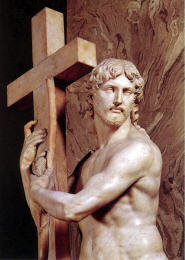
Welcome to the Lenten Workshop! As we enter this season in the spirit of the Church and of her liturgy we seek to wash away the stains of sin and to rid ourselves of all that prevents us from living a truly Christian life. We offer these instuctions, prayers and activities to help in our attempt to be united to our suffering Savior. The more perfectly we are united with Him in the Holy Sacrifice of the Mass and in the Eucharist the more we shall share His new life and glorification at Easter. We hope you will use the following links to discover the meaning of Lent.
- The Mystery of Lent
- The Two-Fold Theme of Lent
- The Springtime of Lent
- The Liturgy of Lent
- The Lenten Fasting Regulations
- Why Ashes?
- Why Fasting and Abstinence?
- Why Forty Days?
- The Precepts of the Church
- Coroporal & Spiritual Works of Mercy
- The Stational Church
- On the Physical Death of Jesus Christ (JAMA article)
Take up your cross and follow Jesus, and you will enter eternal life. If you die with Him, you will also live with Him, and if you share His suffering, you will also share His glory.
A Personal Program
It should not be enough to slide through Lent by just observing the fast and abstinence laws. We should all undertake a Lenten program, an inward cleansing and purification, for oneself and the family. The program needs to be planned and organized. Ask the question: What shall I and my family do this year for Lent? Goals and activities should be realistic and reasonable.
Read Message for Lent 2025 from Pope Francis for inspiration in living a spiritual Lent. This year's theme is "Let us journey together in hope."
The principal works of Lent can be divided into the following six categories:
1) Fasting and Mortification 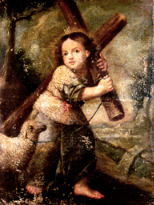 We must fulfill the minimum requirements of the Church for fasting and abstinence. But there are other forms of abstaining and fasting. We must remember that when we do "give up" something, it should be completely, not saved for later. The money we save from not buying a cup of coffee should be given as a donation to charity. The time we don't watch TV should be spent doing spiritual reading, or family time. Below are some examples of other forms of fasting or abstaining:
We must fulfill the minimum requirements of the Church for fasting and abstinence. But there are other forms of abstaining and fasting. We must remember that when we do "give up" something, it should be completely, not saved for later. The money we save from not buying a cup of coffee should be given as a donation to charity. The time we don't watch TV should be spent doing spiritual reading, or family time. Below are some examples of other forms of fasting or abstaining:
- Refrain from complaining, gossiping, grumbling or losing one's temper.
- Abstain from favorite drinks, desserts or foods.
- Eat less at meals, or eat fewer snacks between meals;
- Fast extra days in Lent besides Ash Wednesday and Good Friday.
- Eat without complaining.
- Make simple meals, that are less appealing to the sense of taste.
2) Prayers  Ideally, the members of the family may participate in daily Mass. If this is not possible, the readings from the Mass should be read and meditated upon daily. This could be done as a family, perhaps at the dinner meal. The Mass is the prayer of the Church, and the highest form of prayer. It also unites us with the whole Church in public prayer.
Ideally, the members of the family may participate in daily Mass. If this is not possible, the readings from the Mass should be read and meditated upon daily. This could be done as a family, perhaps at the dinner meal. The Mass is the prayer of the Church, and the highest form of prayer. It also unites us with the whole Church in public prayer.
- Have a strong emphasis in receiving the sacraments of the Eucharist and Penance frequently. For an examination of conscience and for help in receiving the Sacrament of Reconciliation see An Examination of Conscience and An Examination of Conscience for Laymen.
- Another prayer of the Church is the Divine Office, or Liturgy of the Hours. Praying the Divine Office unites our prayers with the Liturgy of the universal Church.
- The Stations of the Cross are special during Lent, because they meditate on the Passion of Christ. Usually the Stations are offered at the parish church on Fridays in Lent. They can also be prayed together as a family.
3) Almsgiving  Almsgiving is tied closely with fasting. Whatever we give up, the money we save should go to the needy. It should be given away to the missions, the Church, or a worthy charity. In a family with small children it helps to make this a visual practice by, for example, having a jar or box in the center of the table as a reminder and measure of progress.
Almsgiving is tied closely with fasting. Whatever we give up, the money we save should go to the needy. It should be given away to the missions, the Church, or a worthy charity. In a family with small children it helps to make this a visual practice by, for example, having a jar or box in the center of the table as a reminder and measure of progress.
It is also considered "almsgiving" to give one's time and goods to those who are in need, i.e., donating time for a soup kitchen, giving clothes to charity, visiting the shut-ins, driving those without transportation and other similar practices.
4) Good Works 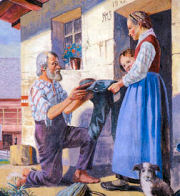 Good works deal with two kinds of actions: perfection of our daily duties and perfection of charity toward others.
Good works deal with two kinds of actions: perfection of our daily duties and perfection of charity toward others.
Our daily duties include our job as a spouse, as a parent, as a child, as a worker or student. We need to strive to do our best in these capacities, even if that means being more patient, more cheerful, more efficient, more charitable, less critical, less gossiping, or less backbiting. We need to make the most of the time we are given each day; we should not waste time. This is the positive area of our Lenten program. We should work on virtues, like obedience, charity, humility, chastity and perseverance.
We should examine ourselves regarding our daily duty at work, at home and how we use the personal time that we have. Many of us postpone or procrastinate personal jobs, prayer and reading for some other time. But NOW is the time to make the best of our daily duty.
See Corporal and Spiritual Works of Mercy
5) Education 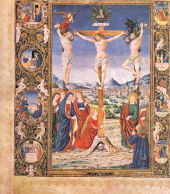 During Lent (and throughout the year) we need spiritual enlightenment. We can find this through spiritual reading, both individually and as a family. This is a prerequisite to a continued growth in the spiritual life. Maria Von Trapp suggests three categories in our Lenten reading program:
During Lent (and throughout the year) we need spiritual enlightenment. We can find this through spiritual reading, both individually and as a family. This is a prerequisite to a continued growth in the spiritual life. Maria Von Trapp suggests three categories in our Lenten reading program:
- Something for the mind. We should do some research, study the papal encyclicals, read the Catechism of the Catholic Church, delve into Church history, study Catholic philosophy.
- Something for the soul. This should be deeper spiritual reading that gives a program, guidance, and spiritual direction, and could include writings of the saints like St. Teresa of Avila, St. Therérèse of Lisieux or St. Francis de Sales.
- Something for the heart. We need inspiration. The best way is to read biographies of Christ, Mary, saints or people who put their spiritual life into action. Bishop Fulton Sheen's Life of Christ is excellent Lenten reading.
Scripture is an excellent source for all these categories. The Church strongly encourages study and meditative reading of the Bible.
6) Self-Denial
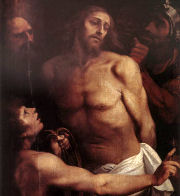 This is the area that tests our will-power. We have the opportunity to give up innocent pleasures without complaining: radio, TV, internet, personal time or leisure, secular reading. We can choose one area in Lent and try to persevere throughout the 40 days. This is not just a test of wills—the main intention is purification, and making reparation for the offenses against the Mystical Body of Christ. So even if these actions are done in private or secret, they help us grow in our spiritual life, and benefit the whole Church. The following are some concrete suggestions:
This is the area that tests our will-power. We have the opportunity to give up innocent pleasures without complaining: radio, TV, internet, personal time or leisure, secular reading. We can choose one area in Lent and try to persevere throughout the 40 days. This is not just a test of wills—the main intention is purification, and making reparation for the offenses against the Mystical Body of Christ. So even if these actions are done in private or secret, they help us grow in our spiritual life, and benefit the whole Church. The following are some concrete suggestions:
- Reduce or eliminate time surfing the Internet or playing video games.
- Curb forms of entertainment like TV, dining out, movies, expensive meals.
- Give up smoking, caffeine, beer and liquor.
Lenten Prayers & Hymns  Lent is a good time to delve into the riches of the Church's prayers and hymns. The Catechism of the Catholic Church calls the musical tradition of the universal Church "a treasure of inestimable value, greater even than that of any other art." While there are many to choose from we offer you the following and encourage you to explore further on your own.
Lent is a good time to delve into the riches of the Church's prayers and hymns. The Catechism of the Catholic Church calls the musical tradition of the universal Church "a treasure of inestimable value, greater even than that of any other art." While there are many to choose from we offer you the following and encourage you to explore further on your own.
- Prayer Before a Crucifix
- Stations of the Cross
- Lenten Psalm
- Hymn: O Head All Scarred and Bleeding
- Hymn: Stabat Mater
- Hymn: Attende Domine - Hear, O Lord
Lenten Activities and Customs  This Lent why not take time to tap the treasuries of the Church's liturgy for your children? How many Catholics use only part of the Church's spiritual riches! We are called to restore things in Christ, so this Lent make time for God. Ordinarily we assign only minutes a day to Him. Yet we need Him so badly in every area of life. Use this section of Catholic Culture's site as a springboard of ideas that you can employ to impress upon your children the great mysteries which we are celebrating in the Lenten season.
This Lent why not take time to tap the treasuries of the Church's liturgy for your children? How many Catholics use only part of the Church's spiritual riches! We are called to restore things in Christ, so this Lent make time for God. Ordinarily we assign only minutes a day to Him. Yet we need Him so badly in every area of life. Use this section of Catholic Culture's site as a springboard of ideas that you can employ to impress upon your children the great mysteries which we are celebrating in the Lenten season.
- The NOW Cross
- Family Chart
- Sacrifice Beans
- Lenten Alms Jar
- Lenten Scrapbook
- Examination of Conscience
- Lent and the Pretzel
- Food for Lent: Whole Wheat Bread
This item 12044 digitally provided courtesy of CatholicCulture.org






